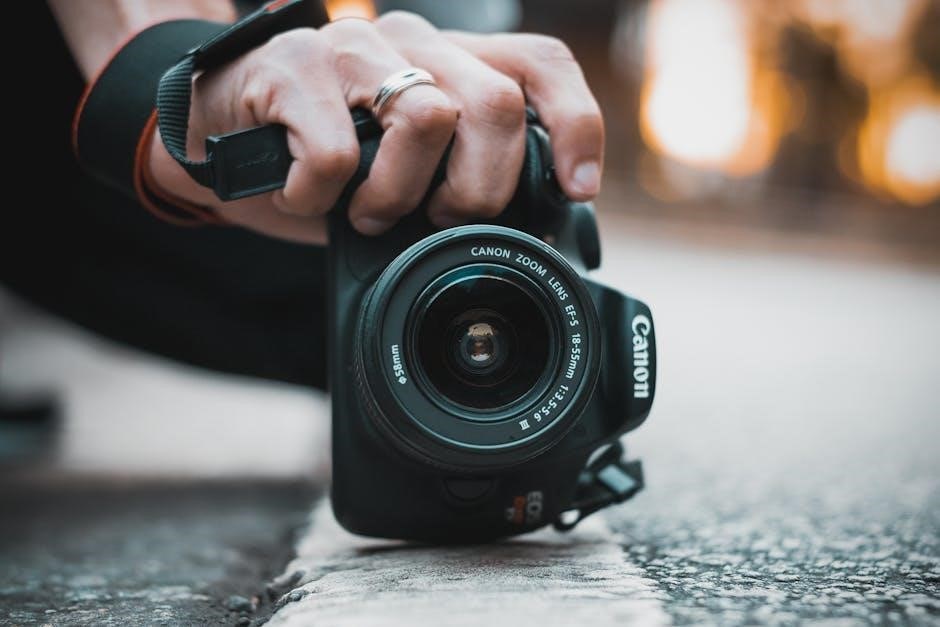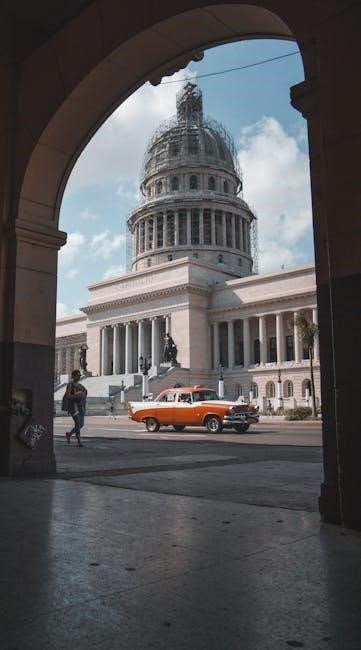Cuba Import Regulations: A Guide to Permitted Products
Navigating Cuba’s import regulations requires understanding the permitted products. This guide provides information about allowed items, including food, hygiene products, medicines, and medical supplies. Stay informed about restrictions, duties, and procedures, ensuring a smooth customs experience.
Overview of Cuban Customs Regulations
Cuban customs regulations are governed by the General Customs of the Republic of Cuba (AGR), ensuring border protection and regulating international trade. These regulations apply to all travelers and international shipments, covering a range of products. Understanding these rules is essential for smooth import processes. Changes and updates are published in the Official Gazette, providing legal guidance for travelers and businesses. Compliance ensures seamless entry and prevents complications.

Non-Commercial Importation
Non-commercial importation refers to goods brought into Cuba for personal use, not for resale or commercial purposes. These imports are subject to specific regulations and allowances, differing from commercial import rules.
Definition of Non-Commercial Importation
Non-commercial importation in Cuba refers to the entry of goods intended solely for the personal use or consumption of the importer and their family, explicitly excluding any intent for resale, trade, or commercial gain. Cuban customs regulations distinguish these items from commercial imports, applying different rules, duties, and quantity restrictions. Understanding this definition is crucial for travelers to comply with Cuban law.
Regulations for Personal Use Items
Cuban customs establishes specific regulations for personal use items brought into the country, focusing on quantity and variety. The items must be diverse and clearly intended for personal consumption, not for resale. While certain essential items, such as food, hygiene products, and medicine, may have relaxed restrictions, travelers should consult the official list to ensure compliance with Cuban import laws regarding personal belongings.

Permitted Products for Import
Cuba allows the import of various products, including food, hygiene items, medications, and medical supplies, especially for non-commercial purposes. Knowing the specific allowances ensures compliance with customs regulations and avoids potential issues upon arrival.
Food Items Allowed for Import
Until March 31, 2024, Cuba permitted the non-commercial import of food items without quantity limits. These products were exempt from customs duties if included in accompanied baggage. This allowance aimed to support residents with essential goods. While the specific list isn’t explicitly provided, it generally covers a range of non-perishable foods intended for personal consumption. Travelers should verify current regulations for any updates.
Hygiene Products Permitted
Similar to food items, Cuba has also permitted the non-commercial import of hygiene products. These products, aimed to improve sanitation, were allowed without quantity restrictions until March 31, 2024. They also enjoyed exemption from customs duties when brought as part of accompanied baggage. While a precise list remains unspecified, common hygiene essentials are generally included. It’s advisable to confirm current regulations for any changes.
Medications and Medical Supplies
Recognizing the importance of healthcare access, Cuba permits the non-commercial import of medications and medical supplies. This allowance, extended until March 31, 2024, included exemptions from customs duties for accompanied baggage. While no specific list is provided, essential medicines, over-the-counter drugs, and basic medical equipment were generally included. It’s important to verify current regulations and quantity limits for specific items before traveling, as rules may have changed.

Items Subject to Customs Duties
Goods exceeding duty-free allowances are subject to tariffs in Cuba. Valuation methods determine customs duties. Understanding these tariffs is crucial for managing import costs. Check the official regulations for accurate duty rates.
Tariffs on Dutiable Goods
When importing goods into Cuba that exceed the established duty-free allowances, tariffs are applied based on the type and value of the items. These tariffs are subject to change, so it is essential to consult the latest official regulations from the Cuban Customs Authority. The tariff rates vary depending on the product category and are typically calculated as a percentage of the item’s assessed value. Understanding the specific tariffs applicable to your goods is crucial for accurate budgeting and compliance with Cuban customs laws.
Valuation Methods for Customs Purposes
Cuban Customs employs specific valuation methods to determine the taxable value of imported goods. These methods are crucial for calculating applicable duties and taxes. The primary valuation method involves assessing the declared value, which should reflect the fair market price of the goods. However, customs officials may use alternative methods, such as comparing prices of similar items or employing a fixed price list, especially for goods without a clear market value. Understanding these valuation methods helps importers accurately declare the value of their goods and avoid discrepancies during customs clearance.

Restrictions and Prohibitions
Certain items face import restrictions or are entirely prohibited in Cuba. Stay informed about these regulations to avoid confiscation. Quantity limits apply to specific products, impacting import allowances.
Items Prohibited from Import
Certain items are strictly prohibited from being imported into Cuba. These prohibitions often include narcotics, pornography, and items that could be deemed a threat to national security. Additionally, certain types of electronics or communication equipment might be restricted depending on their specifications and intended use. Understanding these prohibitions is vital to avoid potential legal issues and confiscation of goods upon arrival in Cuba. Always check the most current official customs regulations before traveling.
Quantity Restrictions on Specific Products
Even for permitted products, Cuba imposes quantity restrictions to differentiate between personal use and commercial importation. These limits vary depending on the type of goods. For example, while importing food, hygiene products, medicines, and medical supplies may be allowed without customs duties, excessive amounts could raise suspicion. Authorities may interpret large quantities of a single product type as intent for commercial purposes, leading to potential confiscation or the imposition of duties.

Customs Procedures and Processes
Cuban customs procedures involve several steps. Travelers must complete the DViajeros form and navigate the Green or Red channels. Understanding these processes ensures compliance with regulations when importing goods into Cuba, streamlining the customs experience.
The “DViajeros” Form
The “DViajeros” form is a mandatory online document for all travelers entering Cuba. This digital form streamlines customs and immigration processes by allowing passengers to submit their information electronically before arrival. Completing the DViajeros form helps expedite entry procedures at Cuban airports and ports, reducing wait times and facilitating a smoother travel experience. It also minimizes document exchange with authorities. Ensure you complete this form before your trip.
Green Channel vs. Red Channel
Upon arrival in Cuba, travelers encounter two customs channels: Green and Red. The Green Channel is for passengers with nothing to declare, carrying only personal effects within duty-free allowances. The Red Channel is for those carrying goods exceeding allowances or requiring declaration. Selecting the correct channel depends on the items you bring. Choose wisely to avoid delays and ensure compliance with Cuban customs regulations. Passengers importing food, medicine and hygiene products may be directed to the green channel.

Weight and Value Limits
Cuban customs regulations impose limits on the weight and value of imported goods. Understanding these restrictions is essential. Exceeding the maximum weight or value results in duties or confiscation. Plan your imports carefully to adhere to Cuban customs guidelines.
Maximum Weight Allowed
Cuban customs regulations stipulate a maximum weight allowance for personal imports. This weight limit encompasses all items brought into the country as accompanied baggage. Exceeding this limit subjects travelers to additional tariffs and potential confiscation of excess goods. It’s crucial to accurately weigh your belongings and understand the specific weight restrictions before traveling to Cuba to avoid complications and ensure compliance with customs laws. Plan your packing accordingly and be aware of the consequences of exceeding the stated weight limits. Proper preparation ensures a smoother entry process.
Maximum Value Allowed
Cuban customs regulations impose a maximum value limit on imported goods. This value, expressed in USD, caps the total worth of items travelers can bring into Cuba for personal use without facing excessive duties. Understanding this limit is essential for planning purchases and packing effectively. Exceeding the maximum value can result in tariffs or confiscation. It’s advisable to keep receipts and declare the value of items accurately to comply with Cuban customs laws and avoid potential penalties. Stay informed about the current value limit to ensure a hassle-free entry.

Duty-Free Allowances
Cuba offers duty-free allowances for certain items, letting travelers bring goods without paying customs duties. These allowances often cover personal effects and specific quantities of other goods. Understanding these exemptions helps minimize costs upon arrival.
Personal Effects Exemptions
Personal effects are often exempt from customs duties when entering Cuba. These typically include clothing, personal hygiene items, and other items intended for personal use during the trip. Quantities must be reasonable and consistent with the duration and purpose of the visit. Be prepared to demonstrate that these items are for personal use and not intended for commercial purposes to avoid any issues with customs officials. Always check the latest regulations to ensure compliance.
Duty-Free Allowances for Residents and Non-Residents
Both residents and non-residents of Cuba are entitled to certain duty-free allowances on imported goods. These allowances typically include a specific value or weight of items that can be brought into the country without incurring customs duties. However, the specific allowances may vary based on residency status and the frequency of travel. It’s crucial to verify the current duty-free limits to avoid unexpected charges; Be sure to keep receipts and declare all items to customs officials upon arrival for a transparent process.

Currency and Payment of Duties
Understanding the accepted currencies for duty payment is essential when importing goods to Cuba. Knowing the exchange rates used for valuation will help you accurately calculate and pay any applicable customs duties on your imported items.
Accepted Currencies for Duty Payment
When paying customs duties in Cuba, it’s crucial to understand which currencies are accepted. The primary currency for duty payment is the Cuban Peso (CUP). However, due to the evolving economic landscape, it’s advisable to confirm the latest regulations regarding accepted currencies before traveling. Keep in mind that official exchange rates are applied when converting other currencies to CUP for duty payments. Ensure you have the correct currency to avoid complications.
Exchange Rates Used for Valuation
Understanding the exchange rates used by Cuban Customs is essential for accurately valuing imported goods. Customs authorities utilize officially established exchange rates to convert foreign currencies into Cuban Pesos (CUP) for duty calculation. These rates are subject to change, so it’s crucial to check the current rates before importing goods. Discrepancies between official rates and informal market rates can affect the final amount of duties owed. Always refer to official sources for the most up-to-date exchange rate information.

Legal Framework and Regulations
Cuban import regulations are governed by specific laws and decrees. Official publications, like the Gaceta Oficial, outline these rules. Understanding this legal framework is vital for compliance when importing goods, ensuring adherence to all Cuban customs requirements.
Relevant Cuban Laws and Decrees
Several Cuban laws and decrees dictate import regulations, impacting what products can enter the country. Decree-Law 22, the Customs Tariff Law, is a key piece of legislation. Resolutions from the Ministry of Finance and Prices (MFP) and the Ministry of Foreign Trade and Investment (MINCEX) also establish tariffs. These regulations are regularly updated and published, impacting both commercial and non-commercial imports; Staying informed on these legal changes is crucial for compliance and avoiding issues with Cuban customs.
Official Gazette Publications
The Official Gazette of the Republic of Cuba is the primary source for updates on import regulations. All changes to customs laws, tariffs, and permitted product lists are published here. This includes resolutions from the Ministry of Finance and Prices and the Ministry of Foreign Trade. Regularly reviewing the Gazette ensures compliance with the latest regulations. The Gazette provides detailed information on permitted items, customs duties, and any restrictions that may be in place, affecting individuals and businesses.
